After two days at the 2018 Our Ocean Conference in Bali, Indonesia, Monaco Explorations joins HSH Prince Albert II for a new mission on the small island of Badu. The island is situated in the Torres Strait, which separates Australia from Papua New Guinea. This mission’s purpose is four days immersion into the culture of the Torres Strait Islanders.
The marine environment is very much a part of the Badugal people’s ancestral traditions and is woven into the rhythm of their daily lives. Their art is also full of marine life, ocean legends and totems of marine animals. For this reason, many local Torres Strait artists participated in the 2016 Taba Naba exhibition at the Oceanographic Museum of Monaco. Among them was Alick Tipoti from Badu, who met with HSH Prince Albert II during the art exhibition. Although living in two apparently opposite societies, the artist and the Head of State share a common vision: that of a balanced and respectful relationship between man and nature. A bond was formed, and here we are two years later and 14,000km from the Principality of Monaco as the two men collaborate to address the challenges facing these island regions.

On October 31st the entire community, from the elders and guardians of island memory, to the children, have been performing dances and customary songs for days, eagerly awaiting the arrival of the Sovereign Prince.

After a reception by the local authorities, artist Alick Tipoti and HSH Prince Albert spoke privately along the island shores. The two discussed, in particular, the problems of erosion of the island coasts during the high tides (also known as “king’s tides”) and the disappearance of the corals. These remote islands are at the forefront of the effects of human activity. From plastic pollution to driftnets and global warming, these dangers, sometimes impalpable, feed the evolution of worry for the islanders.
HSH Prince Albert is the first Western Head of State to visit Badu, and Alick Tipoti and the entire island community were eager to share their worries, experiences, and future hopes with this environmental spokesperson. In doing so, there is an expectation that small island communities such as theirs will be considered equitably during global climate negotiations.

While snorkeling with hopes of encountering some marine turtles and dugongs, the effects of global warming, and consequently multiple bleaching episodes, on the Torres Strait coral reefs were evident. The most severe bleaching episodes have apparently occurred in Australia, suggesting that a majority of corals have died in parts of the Great Barrier Reef. HSH Prince Albert was able to testify to what he witnessed here only a few days later during his meeting with the teams of the Australian Institute of Marine Science and the Great Barrier Marine Park Authority.

To be able to speak with the highest of authority on marine matters, to the most influential decision makers around the world, it is essential to see first-hand and understand island territories such as Badu, which are the places most exposed to the climate change. To meet Monaco Exploration’s goal of reconciling humanity with the sea, we must first understand and experience the relationship that drives this interaction.
Thus, any knowledge and experience that the “elders” will share is crucial. We have asked them: What relationship do you have with nature? How do you use resources? What impact does climate change have on your society? How is your way of life influenced by the Western world?

We have much to learn from island communities and their relationship to the sea. Far from our anthropocentric vision – which places man at the center of the world – these first peoples embrace a holistic vision of nature: plants, animals and men all part of a whole, a global sphere. Although widespread for millennia, this approach is showing its first signs of weakening at an alarming pace under the influence of the dominant Western way of life.
HSH Prince Albert was particularly sensitive to the concerns of these populations in the face of threats posed by globalization, not only to the physical environment but also to their societal future. The erosion of the coast of Badu, combined with the erosion of their ancestral culture, makes them fear the disappearance of their home and their way of life, language and heritage.
The balance that these first human societies maintain with nature appears more than fragile. On one hand, there is the need to evolve and the desire to develop. On the other, a cultural identity rooted in a sacred relationship to the natural world. And so, we realize that this small, insular community of only 200 to 300 souls is at a crossroads.

We hope that the Badulgal people will discover a path, one that demonstrates that economic development and the maintenance of tradition are not only enemies, but can be complementary, necessary, and profitable to communities such as theirs. This path could be that of the circular economy, to preserve our ecosystem and break from the linear economy widely adopted by Western societies (produce, consume, discard).
The interdependence of the Badulgal people and their environment (nature provides for their needs and they strive to maintain it in return), their way of exploiting resources, their knowledge of and interactions with the marine world are all examples for our modern societies, as well as for the message delivered by HSH Prince Albert II to his peers.
 One year ago today we kicked off Monaco Explorations at musée océanographique de Monaco with a press conference and a room full of support from the community. It has been a good year with missions in Madeira, Cabo Verde, Transatlantic, Martinique and Malpelo. We are proud to support science and help to protect our oceans.
One year ago today we kicked off Monaco Explorations at musée océanographique de Monaco with a press conference and a room full of support from the community. It has been a good year with missions in Madeira, Cabo Verde, Transatlantic, Martinique and Malpelo. We are proud to support science and help to protect our oceans.
[vc_row][vc_column width=”1/4″][gem_image style=”1″ src=”25764″][/vc_column][vc_column width=”3/4″][vc_column_text]The transoceanic exploration vessel, Yersin, will depart from Port Hercules in Monaco July 2017 and return Summer 2020. The vessel will navigate during three years the globe with the Monaco Explorations team alongside scientific and media teams, and will visit approximately nine (9) areas to conduct scientific research in remote locations on the sea.
Initiated by HSH Prince Albert II of Monaco and with the support of the Princely Government and the ship’s owner François Fiat, the Monaco Explorations campaign will continue the Principality’s long tradition of sea exploration as well as its influence in politics and policies of sea conservation. The campaign provides a research platform for dozens of scientists worldwide and aims to raise public awareness regarding the research findings as well as the many threats facing the seas today. Robert Calcagno, Director of the Institute Oceanographic in Monaco, will lead the missions.
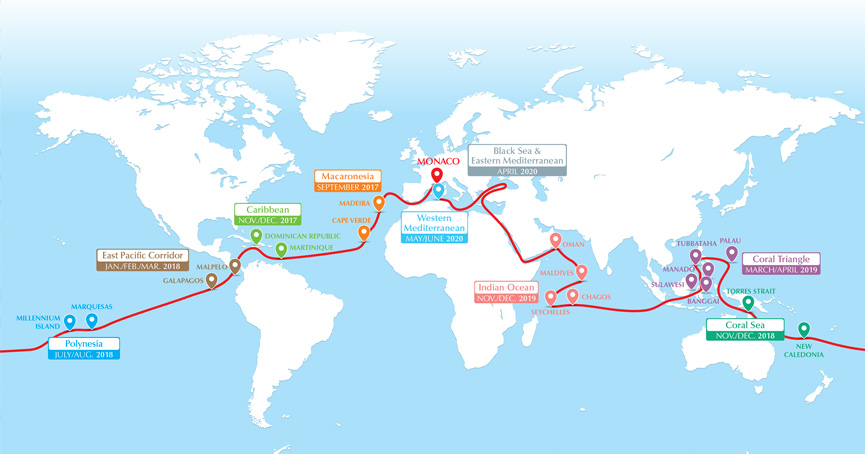
“The greatest ills the oceans suffer are the result of our ignorance…” said HSH Prince Albert II at the press conference at the United Nations headquarters on the eve of World Oceans Day.
“The ocean depths are in large part unexplored, the intermediate areas almost ignored, marine biodiversity is widely misunderstood. We struggle to identify the multiple threats and effects, whether it is about the acidification of the oceans, on which I have been mobilising myself for years, about pollution, particularly plastics, or about the weakening of some ecosystems, which are, upsetting the balances of our seas. “
The first stop of the campaign will be in Macaronesia, a group of four archipelagos in the Atlantic Ocean, and Cape Verde off the western coast of Africa. The focus on this stop will include studying biodiversity and mega fauna, marking for data collection, extracting environmental DNA, and developing a deeper understanding of the chemical and biological effects of global warming. Researchers will study little known but very rich areas of biodiversity such as seamounts and, finally, there will be a focus on the development of programs dedicated to protecting endangered species.
The Monaco Explorations campaign’s scientific programs as well as the equipment on the vessel were carefully selected by the Scientific Steering Committee; a global team of internationally renowned scientists who are also leaders of recognized research organizations in marine biology. Professor Patrick Rampal, Director of the Centre Scientifique de Monaco, a coral and marine research center based in the Principality, heads the Committee.
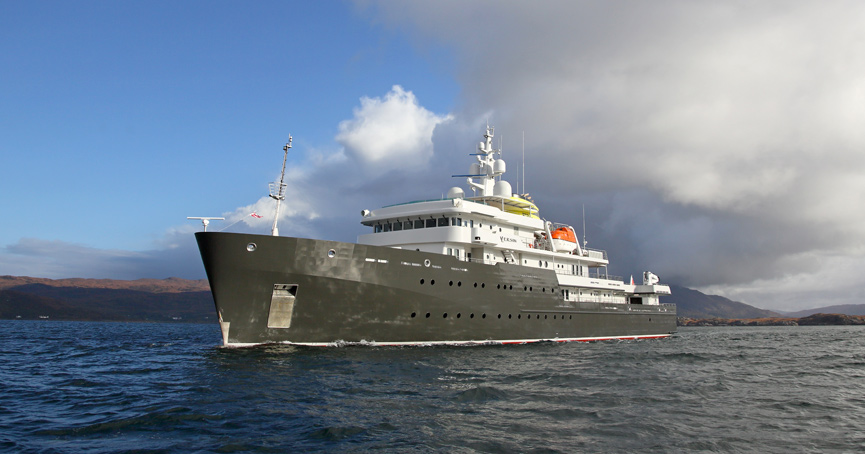
The Yersin is a 250-foot classified “clean ship” and was built to have as little environmental impact as possible. The ship includes six scientific laboratories with the latest technological equipment.
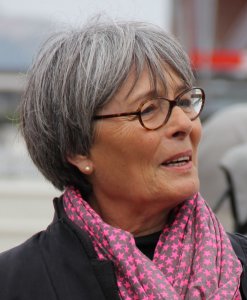 “The ocean is the last continent to be explored,” says French biologist and member of the Monaco Explorations Scientific Steering Committee Françoise Gaill, “The ambition here is to go to the lesser known and most remote areas because the hypothesis is that there is no doubt these areas are a refuge for biodiversity, especially for large animals.”
“The ocean is the last continent to be explored,” says French biologist and member of the Monaco Explorations Scientific Steering Committee Françoise Gaill, “The ambition here is to go to the lesser known and most remote areas because the hypothesis is that there is no doubt these areas are a refuge for biodiversity, especially for large animals.”
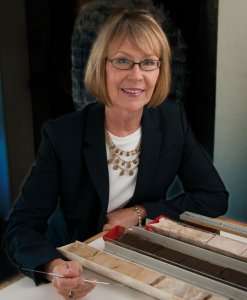 “Research is expensive yet time at sea is essential,” says Scientific Steering Committee member Margaret Leinen, Director of Scripps Institution of Oceanography at the University of California San Diego. “Scientists need innovative and efficient infrastructures and equipment and state of the art ships to conduct sampling and observations that further our understanding of the ocean. Having this ship, designed for science and on expeditions that will visit all oceans is a significant opportunity thanks to Monaco Explorations.”
“Research is expensive yet time at sea is essential,” says Scientific Steering Committee member Margaret Leinen, Director of Scripps Institution of Oceanography at the University of California San Diego. “Scientists need innovative and efficient infrastructures and equipment and state of the art ships to conduct sampling and observations that further our understanding of the ocean. Having this ship, designed for science and on expeditions that will visit all oceans is a significant opportunity thanks to Monaco Explorations.”
With a long history of conviction and political engagement in favor of the protection of the Ocean, HSH Prince Albert II will attend the United Nations Conference to support the implementation of “Sustainable Development Goal, 14: Conserve and sustainably use the oceans, seas, and marine resources” in New York City with His political and personal goals of focusing on expanding and developing marine protected areas through the Monaco Explorations platform.
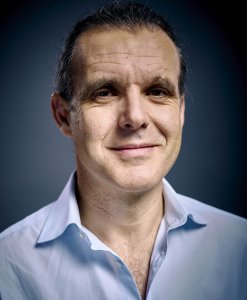 Enric Sala, also a Scientific Steering Committee Member and Chief Explorer at National Geographic said, “Marine protected areas are our national parks in the sea. They protect places of great ecological value and bring back marine life that is disappearing elsewhere.”[/vc_column_text][/vc_column][/vc_row]
Enric Sala, also a Scientific Steering Committee Member and Chief Explorer at National Geographic said, “Marine protected areas are our national parks in the sea. They protect places of great ecological value and bring back marine life that is disappearing elsewhere.”[/vc_column_text][/vc_column][/vc_row]
https://www.youtube.com/watch?v=5CukYy0hIAM&t=1110s
